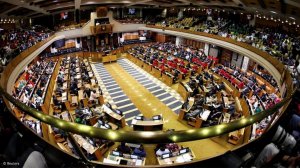A draft impeachment procedure drawn up in April 2016 and a comparative study about impeachment proceedings in seven other countries will be among the documents members of parliament (MPs) will work through on Wednesday when the National Assembly Subcommittee on Review of Rules meets to deliberate on a draft procedure to remove the president in terms of section 89 of the Constitution.
"This follows the Constitutional Court's judgment handed down on 29 December 2017 that the National Assembly had failed to put in place proper rules regulating a procedure for section 89(1) of the Constitution," reads a statement from parliamentary spokesperson Moloto Mothapo.
"The Constitutional Court ordered the National Assembly to make such rules without delay to initiate a process under section 89(1), in terms of the newly developed rules."
He said MPs serving on the subcommittee had been supplied with documents to be considered there, including a draft procedure drawn up in April 2016, but not finalised, and a comparative study, compiled in 2015, about impeachment proceedings of seven other parliaments on the removal of a head of state.
City Press reported that the draft from 2016 outlines the proposed procedure on the tabling and processing of a motion to remove a president, stating that such a motion should be based on a recommendation to that effect by a committee of the National Assembly appointed to consider any relevant charges against a president.
This would be an ad hoc committee appointed by the National Assembly or the Speaker.
"A member may by motion propose that the assembly initiate proceedings in accordance with these rules to remove the president from office in terms of section 89 of the Constitution," it says.
Two-thirds supporting vote needed
The Speaker may disallow a proposed motion to initiate proceedings only if it does not comply with the specified criteria and if a proposed motion is disallowed.
The committee will also meet on Thursday, and the draft procedure, once finalised by the subcommittee, would need to be adopted by the National Assembly as part of its rules.
The South African Constitution does not specifically use the word impeachment, but section 89 of the Constitution describes a mechanism similar to what is called impeachment elsewhere.
The Constitution says the National Assembly must adopt, with a two-thirds supporting vote, a resolution to remove the president from office, only on the grounds of a serious violation of the Constitution or the law, serious misconduct or an inability to perform the functions of the office.
If the president is removed through this method for the first two reasons mentioned above, he may not receive any benefits of that office, and may not serve in any public office.
The subcommittee will have to flesh out how this will work.
Previous DA motion rejected
Even though there wasn't a prescribed process, Democratic Alliance leader Mmusi Maimane brought a so-called impeachment motion to the National Assembly in April 2016, after the Constitutional Court ruled that President Jacob Zuma failed to uphold the Constitution due to his handling of the Public Protector's recommendations relating to the Nkandla matter.
In his motion, Maimane asked that Parliament appoints an ad hoc committee to investigate whether Zuma should be removed. This committee would then have reported back to the National Assembly which will then decide whether he should be removed or not. The African National Congress voted against this motion and, subsequently, the ad hoc committee never was appointed.
In 1998 former US president Bill Clinton was impeached for perjury and obstructing the ends of justice in the wake of his affair with White House intern Monica Lewinsky, but it was decided not to remove him from office.
In 1974 impeachment proceedings were instituted against Richard Nixon following the Watergate scandal, but he resigned before proceedings got underway.
Last year South Korea removed Park Geun-hye following her impeachment after her aide Choi Soon-sil used her position to seek donations from businesses and influence Park's work.
In 2016 Brazil's Dilma Rousseff was removed from office after she was impeached over allegations of corruption.
EMAIL THIS ARTICLE SAVE THIS ARTICLE
To subscribe email subscriptions@creamermedia.co.za or click here
To advertise email advertising@creamermedia.co.za or click here











